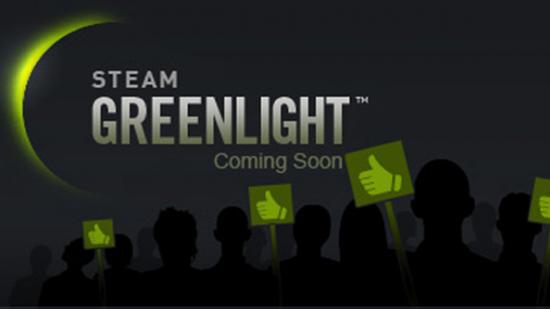Steam’s new Greenlight service, where independent developers will be able to put themselves up on Steam, harness the power of their communities and get Valve’s attention with a big neon sign saying ‘Put me on Steam! I will make you money!” was announced last night at a small bar in South London, to an audience of indie devs that will be using the service when it launches on the 30th August.
Being outspoken creative types, it’s only right that they had something to say about Valve’s new attempt at streamlining the application process for indie games, and so I ran around the gathered masses with a tape recorder, desperately snatching snippets of opinion out of the air like wayward butterflies. Here’s my haul.
Dan Marshall – Size Five Games (Time Gentlemen Please, Privates, The Swindle)
“I just think this is a massive weight off the mind of Indie Developers worldwide – that back-of-the-mind worry that Steam could just turn around and go ‘lol, no’ and throw you into horrendous turmoil. It’s also made the process transparent – I got Time Gentlemen, Please! on Steam and to this day I honestly have absolutely no idea how. I’m really looking forward to getting my teeth into Greenlight.”
Paul Taylor – Mode7 (Frozen Synapse)
“This is a great move to open up the process of Steam submission. It emphasises creating stuff that excites people and that’s what Indie Development should ultimately be about.”
Mike Bithell – (Thomas Was Alone)
“This is lovely, genuinely lovely. The most common email in my inbox since releasing Thomas Was Alone has been ‘put it on Steam.’ Up until now, I’ve had to work really hard not to just forward them to Valve, or organise some sort of friendly protest. Now I have somewhere to point them to!”
Andrew Roper – Indie Skies (Boulder Run)
“My first reaction to Greenlight was along the lines of ‘Oh wow, this is awesome.’ It gives Indies almost a second chance to get on Steam through community support, without having to wait for the impending judgement from the approval team. My only issue with it is that if a poor game has a very large following, it could stop a fantastic game with a low following from getting on Steam.”
Ed Key -(Proteus)
“The take-away for me is that they don’t care how far that progress bar has gone, and to what extent that curator process still exists. If 250 people like it in half an hour, does that flag something up, does that spike get their attention, doing basically what they’re doing now, telling them that this is interesting, and this has potential. How much is it now purely a popularity contest?”
Anonymous
“I think it’s fair to say that Valve’s current process is problematic. That people submit to Valve and have no idea why a game gets rejected or why it gets accepted. But it means that somebody at Valve is playing the game and they like it, and that’s why the game gets on Steam. What they’re suggesting now may totally remove them from the process and turn it into an environment where you have to be a marketer to get your game on Steam. You have to be able to drum up support, you have to be able to get people interested in your game. You have to reveal a lot of things about your game that you may not want to reveal at an early stage of development, just to get an audience, to get people interested, and to get your game on basically the only PC platform where you can sell games.
I’m concerned that this may make it harder for people who make small, personal, interesting games to get on Steam, because what they make may not necessarily appeal to the demographics that Steam is hoping will get interested in this.”
Andy Hodgetts- TheIndie Stone (Project Zomboid)
“I think it’s quite exciting. Whereas before we just had facebook pages and Twitter to talk about stuff, and really, what does it do when someone clicks a ‘like’ button on a facebook page? It doesn’t really achieve anything for the developer. But to be able to point people to a Greenlight page, then everyone clicking that little button is actually contributing to the developer, it’s helping push things forward.
That also means that we as a developer can help publicise other developers, and point our customers at other games. It puts power with the developers, and Indie Developers have always been quite groupie and huggy anyway, and this ties into that. It’s possible to be quite cynical about it, but I think it is going to be what we make of it. And if we choose to adopt a kind of group, huggy way of dealing with it, it’ll be a very friendly and beneficial way of publicising games.”
